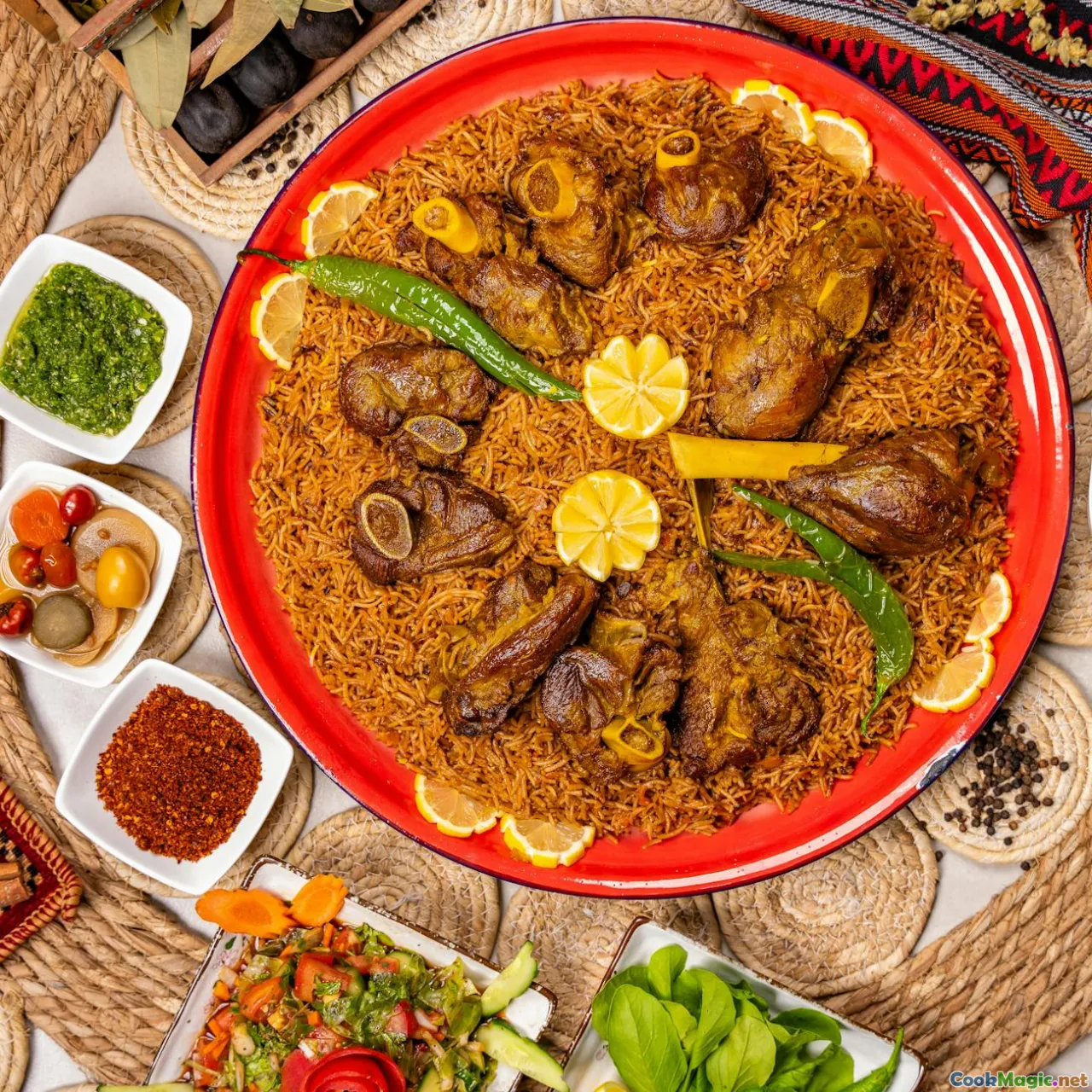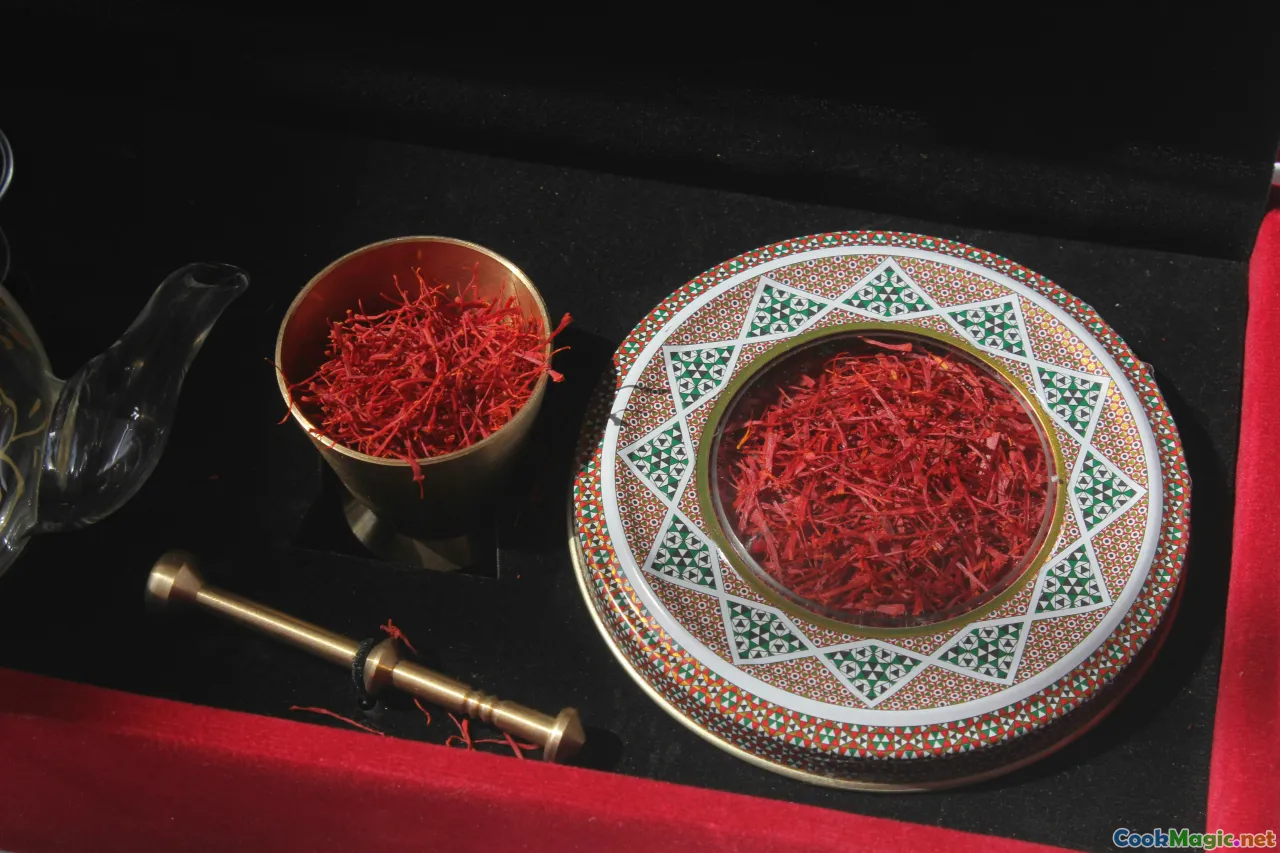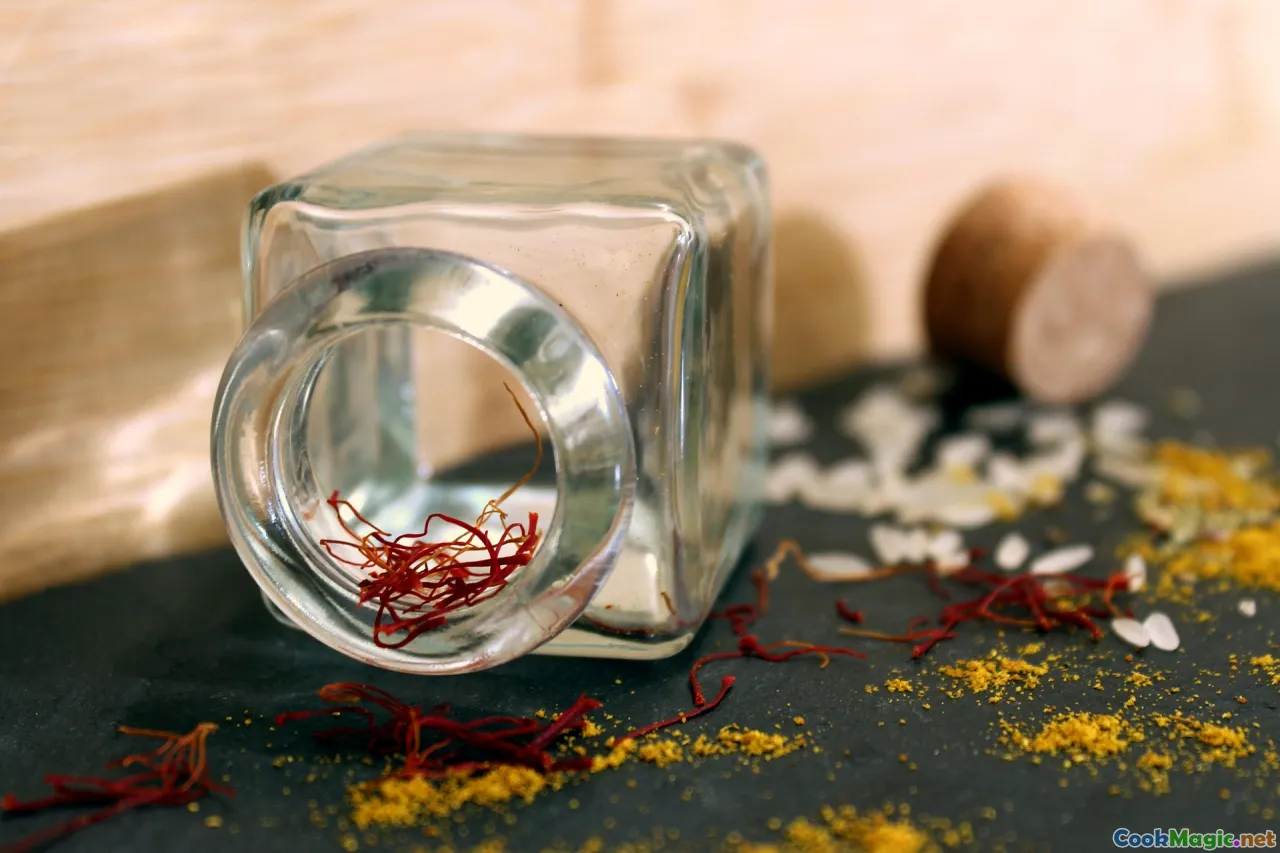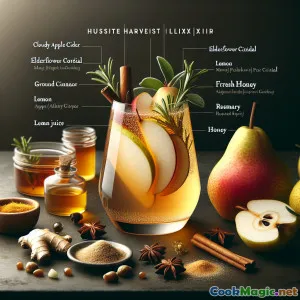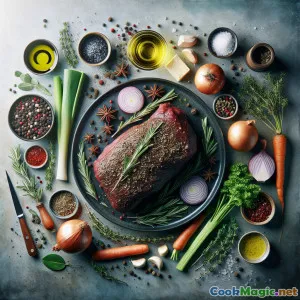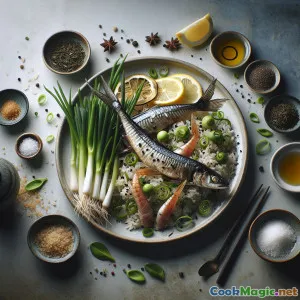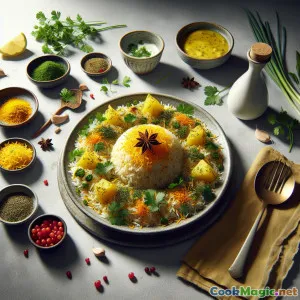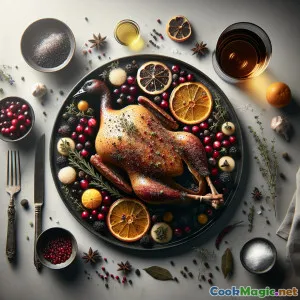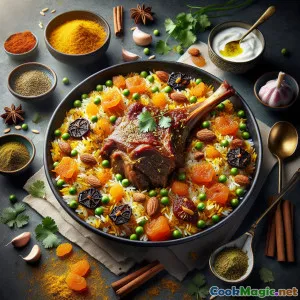
خروف زوربيان: لذة الأرز بالزعفران العطري
(Zurbian Lamb: Aromatic Saffron Rice Delight)
(0 المراجعات)المكونات
-
800 grams كتف الضأن
(Preferably bone-in, cubed)
-
350 grams أرز بسمتي
(Long grain for fluffy texture)
-
1 generous pinch خيوط الزعفران
(Soaked in 3 tbsp warm milk)
-
150 grams زبادي
(Plain, full-fat, for tenderizing)
-
2 medium البصل الأصفر
(مقطع بشكل رقيق)
-
5 cloves فصوص الثوم
(مفروم)
-
2 teaspoons كمون مطحون
-
2 teaspoons كزبرة مطحونة
-
1.5 teaspoons بودرة جارام ماسالا
(Sub: mild curry powder)
-
0.5 teaspoons قرفة مطحونة
-
4 pods قرون الهيل
(مطحون)
-
2 leaves أوراق الغار
-
60 grams المشمش المجفف
(Chopped, for touch of sweetness)
-
40 grams لوز مقطع شرائح
(للتزيين)
-
20 grams كزبرة طازجة
(مفروم، للتزيين)
-
2 tablespoons زيت عباد الشمس
(Or neutral oil)
-
2 tablespoons السمن
(Or unsalted butter)
-
2 teaspoons ملح
(اضبط حسب الذوق)
-
600 ml مرق الدجاج
(يفضل أن يكون منزلي الصنع)
-
1 teaspoon فلفل أسود
(مطحون طازج)
-
80 grams البازلاء الخضراء
(Optional for color/texture)
(Preferably bone-in, cubed)
(Long grain for fluffy texture)
(Soaked in 3 tbsp warm milk)
(Plain, full-fat, for tenderizing)
(مقطع بشكل رقيق)
(مفروم)
(Sub: mild curry powder)
(مطحون)
(Chopped, for touch of sweetness)
(للتزيين)
(مفروم، للتزيين)
(Or neutral oil)
(Or unsalted butter)
(اضبط حسب الذوق)
(يفضل أن يكون منزلي الصنع)
(مطحون طازج)
(Optional for color/texture)
التغذية
- الحصص: 4
- حجم الحصة: طبق كبير (300 جم)
- Calories: 720 kcal
- Carbohydrates: 0 g
- Protein: 38 g
- Fat: 30 g
- Fiber: 7 g
- Sugar: 8 g
- Sodium: 1200 mg
- Cholesterol: 90 mg
- Calcium: 210 mg
- Iron: 4.2 mg
التعليمات
-
1 - Marinate the Lamb:
Combine lamb pieces with yogurt, 1 tsp salt, half the garlic, and half of the cumin, coriander, garam masala. Mix well and refrigerate for at least 20 minutes.
-
2 - Prepare the Rice:
Rinse basmati rice until water runs clear. Soak in cold water for 20 minutes, then drain.
-
3 - Fry onions and spices:
Heat oil and half the ghee in a large heavy pot over medium heat. Sauté onions until deep golden. Add remaining garlic, cinnamon, cardamom, bay leaves. Fry 2 minutes.
-
4 - Brown the Lamb:
Add marinated lamb with its juices to the pot. Cook on high until browned on all sides.
-
5 - Simmer the lamb:
Add chicken stock, remaining salt, pepper, rest of the powdered spices, dried apricots (if using). Cover and simmer for 40 minutes until lamb is tender.
-
6 - Par-cook rice and peas:
In a separate pot, boil soaked rice with salt for 5 minutes until half-cooked. Add peas for last minute. Drain well.
-
7 - Assemble and layer:
Layer half the rice over the lamb mixture, spoon saffron milk on top. Add rest of rice, drizzle with melted ghee. Cover tightly with foil and lid.
-
8 - Steam the zurbian:
Cook on low heat for 25 minutes. Turn off heat, let rest for 10 minutes before opening to allow flavors to meld.
-
9 - Garnish and Serve:
Fluff rice gently, top with slivered almonds and chopped cilantro. Serve hot with cucumber yogurt salad if desired.
Combine lamb pieces with yogurt, 1 tsp salt, half the garlic, and half of the cumin, coriander, garam masala. Mix well and refrigerate for at least 20 minutes.
Rinse basmati rice until water runs clear. Soak in cold water for 20 minutes, then drain.
Heat oil and half the ghee in a large heavy pot over medium heat. Sauté onions until deep golden. Add remaining garlic, cinnamon, cardamom, bay leaves. Fry 2 minutes.
Add marinated lamb with its juices to the pot. Cook on high until browned on all sides.
Add chicken stock, remaining salt, pepper, rest of the powdered spices, dried apricots (if using). Cover and simmer for 40 minutes until lamb is tender.
In a separate pot, boil soaked rice with salt for 5 minutes until half-cooked. Add peas for last minute. Drain well.
Layer half the rice over the lamb mixture, spoon saffron milk on top. Add rest of rice, drizzle with melted ghee. Cover tightly with foil and lid.
Cook on low heat for 25 minutes. Turn off heat, let rest for 10 minutes before opening to allow flavors to meld.
Fluff rice gently, top with slivered almonds and chopped cilantro. Serve hot with cucumber yogurt salad if desired.
المزيد عن : خروف زوربيان: لذة الأرز بالزعفران العطري
Zurbian Lamb with Saffron Rice
Background
Zurbian, also spelled ḏurbiyān, commenced as a celebratory rice dish in Yemen but has evocatively traveled and evolved, with memorable versions spreading to different parts of the world, including English kitchens with vibrant international stocks or communities. It now stands as a gastronomic marriage of the mouthwatering warmth of slow-stewed lamb and the vivid radiance of saffron-laced rice—one where both familiarity and adventure reward every bite. Marrying Middle Eastern tradition with a contemporary British spirit, this adaptation highlights premium British lamb, locally accessible basmati, and sprightly English garden peas while honoring its Yemeni ancestry.
Recipe Highlights
-
Laminar Spices: Success relies on sequential layering: cumin, coriander, garam masala warm the lamb core, balanced with perfumed cinnamon, cardamom, and sweet tang from dried apricots.
-
Tenderization: Plain yogurt caresses tough lamb, silkenizing texture and infusing gentle acidity—a classical Middle Eastern marinade secret.
-
Saffron Touch: Undeniably luxurious, saffron ran its royal ribbon through Persian, Indian, and Arab cookery before arriving in England’s ports centuries ago. Its appearance here elevates earthiness with honeyed, ethereal aroma and golden color.
-
Fragrant Basmati Base: Rice soaked and boiled just until half cooked, then steamed to finish, allowing each grain to exist as an individual note in the chorus.
Cultural & Holiday Appeal
Traditionally, zurbian is reserved for feasts, feasts that summon extended family. Here, serve when convivial hospitality is desired—think Easter, Eid, Christmas, or grand autumn Saturday evenings. Like biryani and pilaf, zurbian draws diners to a communal table and repays patient care, from intricate spice tempering to the judicial steaming that ends the affair. It’s a single, spectacular platter, visually gilded and inviting a free-for-all of scooping with flatbread or careful styling with a silver spoon.
Tips & Notes
- Lamb Cut: Using bone-in, shoulder cubes boosts flavor depth, but boneless works for convenience. Trim excess fat for refinement but don’t remove all—some is good for richness.
- Rice: Always thoroughly rinse rice to encourage fluffiness and prevent starch gumminess. Enjoy as either everyday basmati or the special, aged stuff.
- Optional Additions: Peas add color and texture; dried apricots provide contrast against the savory backbone. For festive vibes, rose water sprinkled as rice steams evokes ancient trade routes.
- Make Ahead: Marinate lamb the night before for deeper flavor. Both lamb and rice can be prepped a day earlier and just assembled/steamed when needed.
- Pairing: A classic English mint yogurt dip, pickle, or cool cucumber salad cuts through richness exceptionally well.
Personal Thoughts
I find preparing Zurbian one of the most mood-transforming kitchen projects—the aroma as saffron blossoms mingle with rich meat and subtly sweet onions create homemade culinary warmth. This recipe preserves that sense of joyous occasion but adapts for the home cook seeking comfort, adventure, and a little opulence.
Even as the United Kingdom may not be the ancient home of Zurbians, this fusion illustrates a compelling modern culinary narrative: how centuries of trade, migration, and openhearted borrowing enable us to bring world feasts to our very own dinner tables—no matter where those tables may sit.

